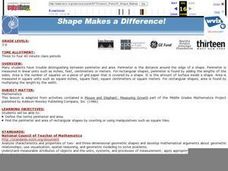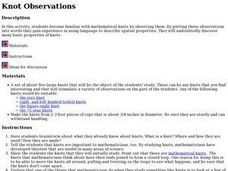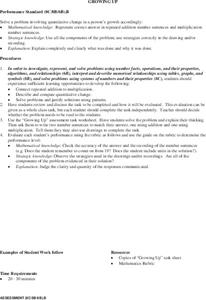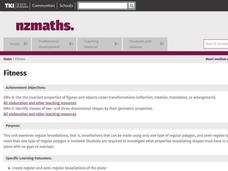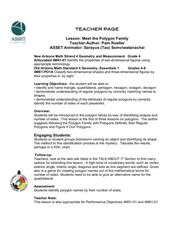Curated OER
Pythagorean Theorem Proof
Tenth graders investigate the Pythagorean Theorem. Then they type up a formal paragraph proof of a proof of their choice.
Curated OER
Lines, Rays, Line Segments, and Planes
Students are introduced to lines, rays, line segments and planes and study the differences between them. They also practice graphing lines, rays, line segments and planes
Curated OER
Shape Makes a Difference!
Students learn the difference between perimeter and area by watching a video and a hands on activity.
Curated OER
Acid and Bases - Alien II
Eighth graders determine which of two solutions is more acidic by adding each to a given base. Students have to apply this analysis process to a problem scenario involving an alien creature.
Curated OER
Counting By 5s
Second graders count by 5's to 100. In this math lesson conducted on the 100th day of school, 2nd graders use picture stamps in the KidPix program to count by 5's and get to 100.
Curated OER
Math: Equal Area Triangles
Learners examine a math worksheet and determine how to divide a single triangle into four of equal area. Using geometric principles, they sketch two additional ways to divide into into four equal triangles. To conclude, students...
Curated OER
Math: Knot Observations
Students discover the importance of knots to mathematicians in developing scientific theories. In small groups, they examine knots and make obeservations about them. Students discuss the ways to distinguish knots and make lists of...
Curated OER
Growing Up
Young scholars solve a given problem and explain their thinking using two number sentences to match their answer. One number sentence must use addition, one must use multiplication, and students must explain their answers. Includes...
Curated OER
Little Magic Squares
Students and teacher talk about arrays of numbers like the ones in A Square of Circles. They check to see that the rows all have the same sum; that the columns all have the same sum; and that the diagonals have the same sum.
Curated OER
Learning by Sorting
Students sort Lego Duplo pieces after determining the attributes to classify them by. They work in pairs to sort a group of Duplo pieces and explain their process to others.
Curated OER
Houses
Third graders use a number of problem solving strategies in this unit of lessons. They determine how to draw and model three-dimensional objects, use co-ordinate systems, determine probability of events, and identify paths of simple...
Curated OER
Copycats
Third graders describe the features of 2 and 3 dimensional objects and use the language of geometry. They design and make a pattern which involves translation, reflection or rotation.
Alabama Learning Exchange
Factoring by Mack
Learners explore the concept of factoring trinomials. In this factoring trinomials lesson, students use the Mack Method to factor trinomials. Learners watch a video on how to factor a trinomial with a coefficient of 1 with...
Curated OER
Efficiency Means Getting More for Less
Learners measure water and make predictions about efficiency.
Curated OER
Rain Drops
Students examine drops of water on several materials used on the outside of buildings. They make selective observations on and compare plastic, wood, brick, metal, roof tiles and glass.
Curated OER
Which Pair?
Students practice solving equations adding decimals and integers. Using a worksheet, they identify which pair of numbers goes correctly with the problem. They review their answers and are graded based a rubric given to them.
Curated OER
Fitness
Fourth graders determine how to design regular and semi-regular tessellations of the plane. They develop the ability to demonstrate why a tessellation covers the plane in this series of lessons.
Curated OER
Henry Builds A Cabin
Students listen to the book "Henry Builds a Cabin." They design a cabin using Lego pieces based on information from the story.
Curated OER
Meet the Polygon Family
Fourth graders investigate regular polygons. In this regular polygon lesson, 4th graders explore the attributes of different polygons. Students work in groups to complete a KWL chart regarding polygons.
Curated OER
Acid Precipitation
Students test the acidity of unknown solutions. They use this information to make inferences from data given from recorded rainfall records to identify areas that receive the most acid rain.
Curated OER
Wig-wag Physics
Learners make observations on the effects of a small, medium and large weight on the movement of a wig-wag apparatus. They use their observations to develop a generalized inference of the effect weight on movement patterns.
Curated OER
Descriptive Writing
Students practice descriptive writing. For this unique writing lesson, students hear a story about a mitten. Then three grade levels come together to first, create a mitten on KidPix; second, describe the designed mitten; and third, try...
Curated OER
Matter
Students complete a unit of activities to learn about states of matter and how to measure matter. In this matter lesson, students complete 8 lessons to learn about matter, its states, and how to measure matter.
Curated OER
Buying My First Car
Students pretend they are about to buy their first new car. They must do all the calculations necessary to estimate the cost of purchasing the car. They see that the math they learn in school really does have real-life applications.




